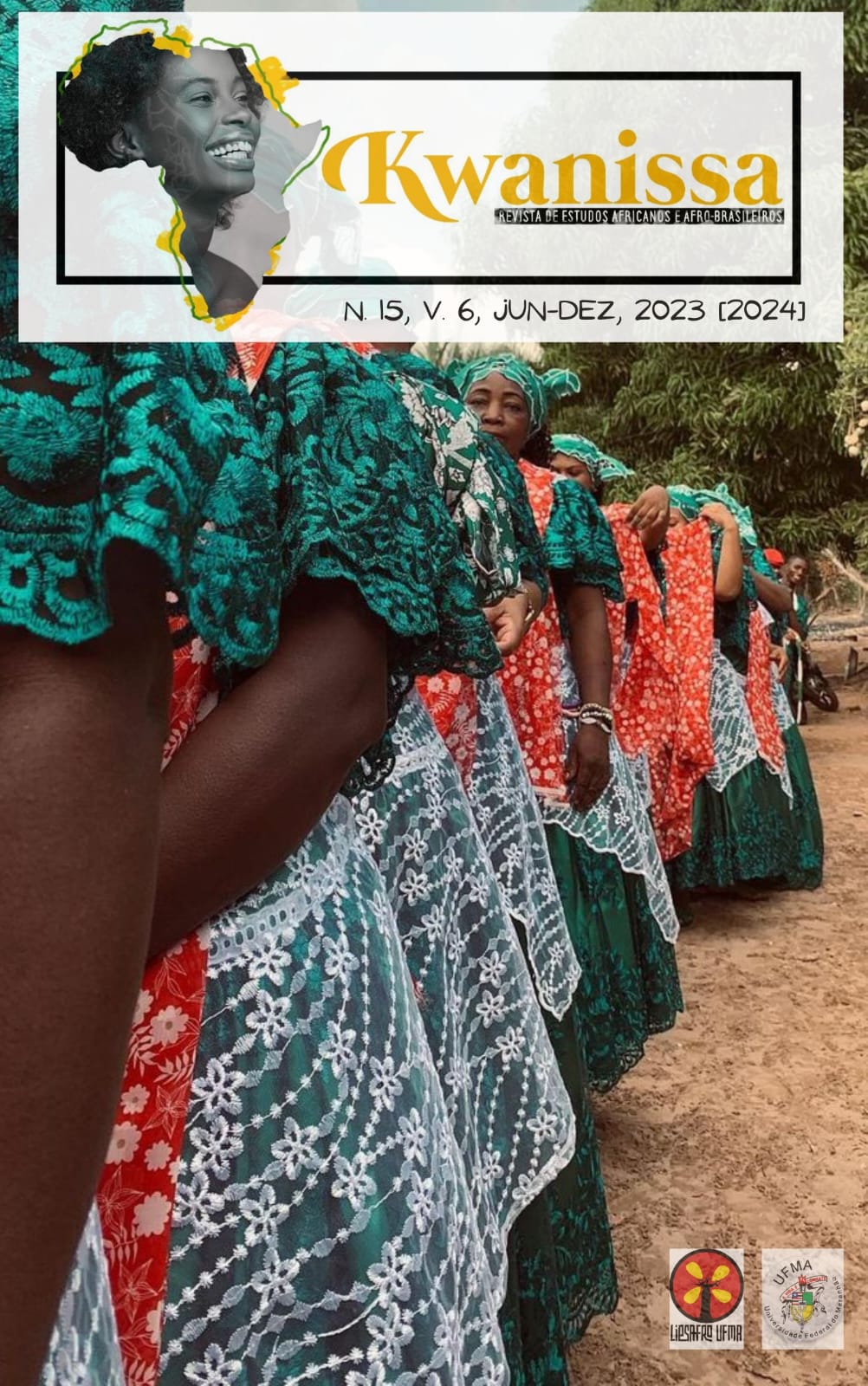ATLANTIC TRANSVERSALITIES:
African ancestral knowledge as technologies of emancipation
DOI:
https://doi.org/10.18764/2595-1033v6n15.2023.22Keywords:
Primal knowledge, technologies, Atlanticity, ancestry, Bantu culture, identityAbstract
The referred proposal of the article addresses a reflective analysis of the project “Atlantic Transversalities: African ancestral knowledge as technologies of emancipation”, having as reference
the atlanticity, which is primal millenary knowledge held in one of the oldest civilizations of humanity, the Bantus, existing for over 5500 years old, and which were brought to Brazil in the context of the slave trade that crossed the Atlantic Ocean. Therefore, it is considered that there is a diversity of emancipation technologies that goes beyond traditional western knowledge, as this primordial power is transtemporal, since it can be compared with concepts of modern science in several issues. In this sense, based on this investigation of his ancestry, the artist Paulo Fernandes makes a relevant contribution with regard to identity relations, recognizing the Bantu culture as one of the greatest contributions to the reflection of afro and brazilian corporeality. The methodology has its scope in the applicability of Law 10.639/2003 and the comprehensive relations about the afro and brazilian cultural identity, as well as the reconstruction of social, ethnological, linguistic and
technological values that insert us into another human perception, opposing the process of the racial
traps that is responsible for retracting us as human beings in the face of the colonization of Eurocentric
hegemony. To this end, the project proposal is an initiative that resulted in the amplification of the
theme of Africanities, recreating a new landscape that revisits the past and makes us guardians of a
fertile heritage, capable of sowing future generations, like a baobab seed that is already born with its potency.
Downloads
References
ARENA, Dagoberto Buim, LOPES, Naiane Rufino. PNBE 2010: personagens negros como protagonistas. Educ. Real. [online]. 2013, vol.38, n.4 [cited 2021-04-21], pp.1147-1173. Available from: <http://www.scielo.br/scielo.php?script=sci_arttext&pid=S2175-62362013000400008&lng=en&nrm=iso>. ISSN 2175-6236. https://doi.org/10.1590/S2175-62362013000400008.
ASSIS. Liliana Cotinho de. Referentes político-normativos de cumprimento dos artigos 26- a e 79-b da Lei de Diretrizes e Bases: uma pauta para a igualdade racial nas escolas. 2018. 156 f. Dissertação (Mestrado) – Programa de Pós-Graduação em Educação, Universidade Federal do Paraná, Curitiba, 2018.
BRASIL. Ministério da Educação. Lei de Diretrizes e Bases da Educação. LEI Nº 9.394, DE 20 DE DEZEMBRO DE 1996.
BRASIL. Ministério da Educação. Diretrizes Curriculares Nacionais Para a Educação das relações étnico-raciais. Parecer CNE/CP 003/2004. Disponível em: http://portal.mec.gov.br/dmdocuments/cnecp_003.pdf Acesso em: 16 de Ago. 2020.
BRASIL. Lei nº 12.288. Estatuto da Igualdade Racial. Disponível em: http://www.planalto.gov.br/ccivil_03/_ato2007-2010/2010/lei/l12288.htm Acesso em: 16 Ago. 2020.
CARDOSO. Cintia. Branquitude na educação infantil: um estudo sobre a educação das relações étnico-raciais em uma unidade educativa do município de Florianópolis. 2018. 190 f. Dissertação (Mestrado) – Programa de Pós-Graduação em Educação, Universidade Federal do Paraná, Curitiba, 2018.
CARMO, Ildete Batista do. Com quem eu me pareço? A construção da identidade étnico-racial na educação infantil. XV EDUCERE. 2015, PUCPRess - Editora Universitária Champagnat. Disponível em: https://educere.bruc.com.br/arquivo/pdf2015/20085_10096.pdf. Acesso em 20 Abr. 2021.
CARNEIRO, Aparecida Sueli; FISCHMANN, Roseli. A construção do outro como não-ser como fundamento do ser. 2005.Universidade de São Paulo, São Paulo, 2005.
DIAS, Lucimar Rosa. No fio do horizonte: educadoras da primeira infância e o combate ao
racismo. 2007. Tese (Doutorado em Educação) – Faculdade de Educação da Universidade
de São Paulo, São Paulo, 2007.
DIAS, Lucimar Rosa, BATISTA, Clarice Martins de Souza (orgs). Reflexões e experiências na construção de uma educação antirracista no contexto do grupo de estudos e pesquisas ErêYá. Curitiba -PR: Brazil Publishing, 2019
GOMES, Nilma Lino. Alguns termos e conceitos presentes no debate sobre relações raciais no Brasil: uma breve discussão. In: BRASIL. Educação Anti-racista: caminhos abertos pela Lei federal nº 10.639/03. Brasília, MEC, Secretaria de educação continuada e alfabetização e diversidade, 2005.
MUNANGA, Kabengele. Uma abordagem conceitual das noções de raça, racismo, identidade e etnia. In: Programa de educação sobre o negro na sociedade brasileira [S.l: s.n.], [2004?]. Disponível em: http://www.planalto.gov.br/ccivil_03/leis/2003/l10.639.htm. Acesso em: 16 Ago.2020.
PEREIRA, Sara da Silva. A Literatura Infantil de Temática da Cultura Africana e Afro -Brasileira, com a palavra as crianças: “Eu So Peta, tenho cacho, so linda, ó!”. 2019. 208 f. Dissertação (Mestrado) – Programa de Pós-Graduação em Educação, Universidade Federal do Paraná, Curitiba, 2019.
PEREIRA, Sara da Silva, DIAS, Lucimar Rosa. A (re) educação das relações étnico-raciais: algumas considerações. In: DIAS, Lucimar Rosa, BATISTA, Clarice Martins de Souza (orgs). Reflexões e experiências na construção de uma educação antirracista no contexto do grupo de estudos e pesquisas ErêYá. Curitiba -PR: Brazil Publishing, 2019.
SANTOMÉ, Jurjo Torres. Globalização e interdisciplinariedade: o currículo integrado. Porto Alegre: Artes Médicas, 1998.
Downloads
Published
How to Cite
Issue
Section
License

This work is licensed under a Creative Commons Attribution-NonCommercial 4.0 International License.
Direitos autorais Kwanissa: Revista de Estudos Africanos e Afro-Brasileiros
Este obra está licenciado com uma Licença Creative Commons Atribuição-NãoComercial-SemDerivações 4.0 Internacional.











